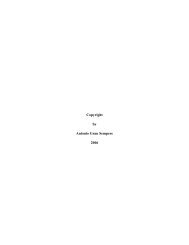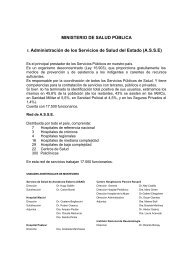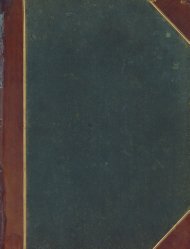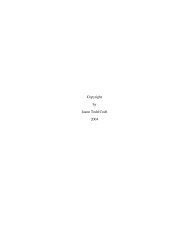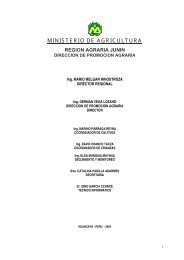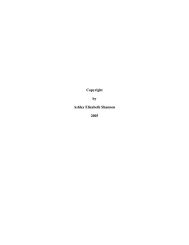Translating Nouzha Fassi Fihri's La Baroudeuse: A Case Study in ...
Translating Nouzha Fassi Fihri's La Baroudeuse: A Case Study in ...
Translating Nouzha Fassi Fihri's La Baroudeuse: A Case Study in ...
You also want an ePaper? Increase the reach of your titles
YUMPU automatically turns print PDFs into web optimized ePapers that Google loves.
would get excited about these stories--and I was not excited. This makes it pretty<br />
clear that my "agenda" really was to turn on an English speak<strong>in</strong>g audience (one<br />
that would be as broad and unprofessional as possible) to contemporary Arabic<br />
literature and to what women were writ<strong>in</strong>g and say<strong>in</strong>g. I th<strong>in</strong>k this needs also to<br />
be put <strong>in</strong> a "nonliterary" context. That is, I was already sick at the time of people<br />
ask<strong>in</strong>g me: (1), oh, is there an Arabic literature? and (2) you mean, Arab women<br />
are allowed to write? yuck. Most upsett<strong>in</strong>g was when white American fem<strong>in</strong>ists<br />
would ask these questions. So I felt somewhat militant about it all. At the same<br />
time, I have also always felt strongly about not reduc<strong>in</strong>g literary works to<br />
sociological panoramas. I wanted readers first and foremost to feel transported<br />
(and not geographically!) by these works; to feel the literary excellence, to love<br />
the stories. But--back to my story--I wasn't lov<strong>in</strong>g the stories. The moment when I<br />
felt I had someth<strong>in</strong>g--and knew I had to do that collection--was when I read<br />
Radwa Ashur's "Ra'aytu al-nakhl" (the story, <strong>in</strong> Adab wa-naqd I believe--not her<br />
collection by that name which came out much later). I loved it. This is also why I<br />
was delighted that the title I f<strong>in</strong>ally came up with referred to her story. That story<br />
(still my favorite, one of my most favorite short stories <strong>in</strong> the world) gave me the<br />
shape of a collection. But what would go with it? I gradually found other stories<br />
by relatively new writers. Remember, this wasn't now, when there is wonderful<br />
stuff com<strong>in</strong>g out at Dar Mirit and elsewhere--it was really hard to f<strong>in</strong>d these<br />
th<strong>in</strong>gs. But I also went through a process of worry<strong>in</strong>g about and doubt<strong>in</strong>g my own<br />
literary judgement. Was I be<strong>in</strong>g fair to these authors I was reject<strong>in</strong>g? What was<br />
wrong with my read<strong>in</strong>g? A crucial day was when I went, <strong>in</strong> despair, to Idwar al-<br />
Kharrat, such a wonderfully supportive and fantastic and humorous <strong>in</strong>dividual of<br />
whom I am very fond--and I said to him, I recall, Ustadh Idwar, ana khayfa... and<br />
went on to say that I was f<strong>in</strong>d<strong>in</strong>g almost noth<strong>in</strong>g and was really start<strong>in</strong>g to doubt<br />
my own soundness as a reader and as presumably a literary scholar. He asked me,<br />
who have you found? I told him, he laughed and said you are totally on the right<br />
track, you have found the right people. That day, as I said, was crucial to the<br />
collection and to my sense of myself as a reader! (and audience).<br />
How strong was your awareness of this audience?<br />
I hope I have answered this, though perhaps not so directly. I can say that if I had<br />
had <strong>in</strong> m<strong>in</strong>d an audience of students, I might have chosen (and it would have been<br />
a mistake) stories with more obvious closure. I have taught this collection, once,<br />
and students are frustrated with it because it doesn't give them answers--but that is<br />
a good th<strong>in</strong>g.<br />
How would you characterize your attitude toward the orig<strong>in</strong>al Egyptian and<br />
Arabic audience and cultural context?<br />
This is a tough question because I can never know--I don't th<strong>in</strong>k anyone can-exactly<br />
who that audience is or was. But what I do recall is f<strong>in</strong>d<strong>in</strong>g out gradually,<br />
through my own digg<strong>in</strong>g for stories and then their authors, that the writers I<br />
f<strong>in</strong>ally chose felt somewhat alienated from their supposed, "natural" audiences--as<br />
I felt alienated from m<strong>in</strong>e, <strong>in</strong> the sense of a broadly conceived English-speak<strong>in</strong>g<br />
non-scholarly "<strong>in</strong>tended audience" most of whom, I know, couldn't care less about<br />
Arabic literature. So, there was a sort of bond there. I want to say at this po<strong>in</strong>t that<br />
267








